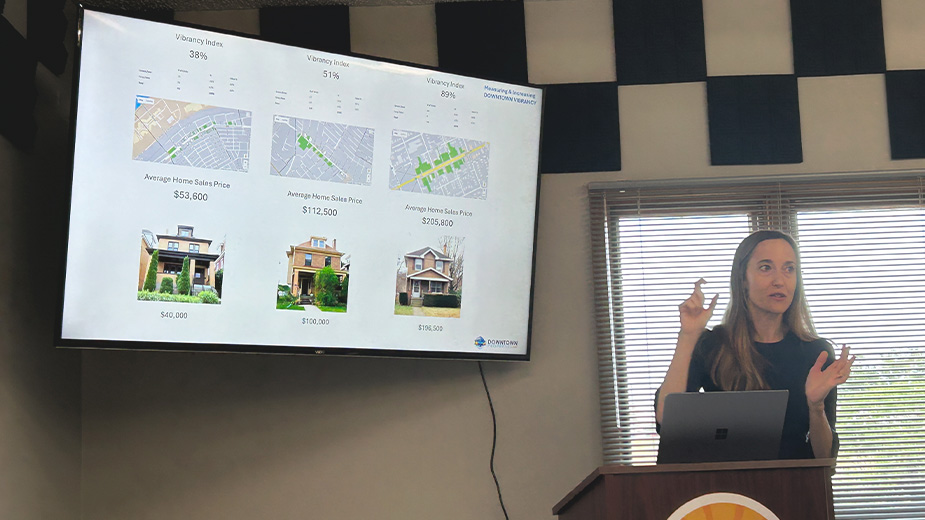Court Awards City $733K in Damages in Chill-Can Case
YOUNGSTOWN, Ohio – A Mahoning County Common Pleas Court ruled Thursday that the city is entitled to $733,480.80 in damages from the developer of the ill-fated Chill-Can complex on the East Side.
The damages were awarded after attorneys representing the city and M.J. Joseph Development Corp. appeared before Magistrate Dennis J. Sarisky on May 24 regarding a dispute over discovery documents related to the ongoing lawsuit between the parties.
Despite several motions and a court order compelling the company to turn over the information, the city contended that M.J. Joseph failed to do so and in April filed motions requesting that the court order sanctions against it.
Sarisky agreed, noting in his ruling that M.J. Joseph Corp.’s actions “have materially delayed the process of this lawsuit and prejudiced the city of Youngstown.”
The sanctions include $733,480.80, which is the amount of additional damages the city is seeking in its counter-complaint against M.J. Joseph. The magistrate also awarded the city attorney’s fees related to discovery motions it filed seeking documents and information.
In his order, Sarisky cited M.J. Joseph’s “repeated noncompliance and the number of failed opportunities this court provided the plaintiffs to correct their faulty behavior, and the fact that plaintiff’s behavior has resulted in substantial delays and expense to the city.”
Judge Maureen Sweeney affirmed in November Sarisky’s earlier ruling that the developer was in breach of contract and ordered M.J. Joseph to repay the city $1.5 million in grant money it received for the project.
The $733,480 award is in addition to the $1.5 million, bringing the total to more than $2.23 million.
According to the city’s filing after the May 24 hearing, M.J. Joseph “failed to present any meritorious reason for why they repeatedly have failed to comply with this court’s orders and their discovery obligations.”
At issue were the status of equipment that the city said was covered as collateral as part of a security agreement M.J. Joseph signed with the city in order to obtain the $1.5 million grant.
Attorney Thomas Hull II told Sarisky at the May 24 hearing that the city became concerned about the equipment’s whereabouts after a Business Journal story reported the building in California that housed the machinery was sold.
However, attorneys for M.J Joseph said in its response that the city disregards and mischaracterizes the scope of discovery it has already provided, including nearly 1,700 pages of documents.
As such, M.J. Joseph’s attorneys requested that the court deny the city’s motions for sanctions and issue a protective order “prohibiting the city’s counsel from continuing with abusive discovery tactics,” according to court papers.
Attempts to reach Brian Kopp and Justin Markota, attorneys for M.J. Joseph, requesting comment were unsuccessful. A call to city law director Jeff Limbian was also not immediately returned.
In March 2021, the city notified M.J. Joseph and its CEO, Mitchell Joseph, that it was in breach of development and enterprise zone agreements the parties signed in 2017. Under the development agreement, the city awarded the company $1.5 million to prepare a 22-acre site on the East Side for a manufacturing and research campus that would produce self-chilling beverage cans.
The project was supposed to create more than 230 jobs. The company today lists just one employee, and three buildings remain empty at the site more than six years later.
Anticipating a lawsuit, M.J. Joseph filed a complaint in May 2021 against the city, saying it wasn’t entitled to a refund of the $1.5 million.
The city countersued for return of the grant money, plus $414,948 in property acquisition and relocation costs, and another $318,523 in demolition and abatement expenses the city incurred for the project.
According to earlier filings, the city also seeks return of the land and buildings now on the site.
Kopp has earlier said that company president Mitchell Joseph, CEO of Joseph Co. International of Irvine, California, has invested more than $5 million of his own money into the project.
“Ultimately, we believe that this matter will go to trial sometime in the fall on some or very limited issues,” Kopp told reporters after the May 24 hearing. “Nothing would make the Joseph Co. happier than to settle this case.”
Copyright 2024 The Business Journal, Youngstown, Ohio.



